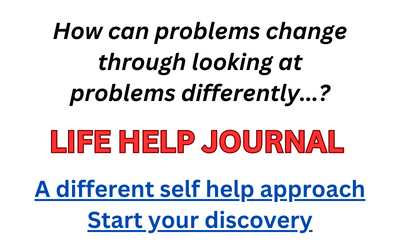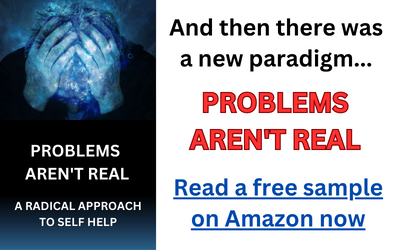Psychotherapy, sometimes referred to as talk therapy, definitely has its place: there is something to be said for expressing hurts and problems to a “safe” source. Having said that, any psychotherapy that doesn’t put specific emphasis on affecting thought processes is very limited in its effectiveness.
Why? Because thought processes — the voice within our head — is the cause of all emotional suffering. Most people believe that emotional hurts, whether depression or anxiety or something else, are caused by external circumstances. This or that happened, or is happening, and so I feel depressed or anxious or some other hurtful response. This causation theory is wrong. Wrong!
Here is the way emotional suffering occurs: a negative thought stream arises, sometimes in response to external circumstances and sometimes not; this thought stream is recognized and accepted as truth; the acceptance of this thought stream as truth triggers a bodily response which we label as depression, anxiety, despair, rage, etc.
There it is. There is the cause, and reason, for your emotional suffering. Do you doubt this? If so, here’s a challenge: try to feel depressed, anxious, hopeless, etc. while being completely clear of thought. You can’t do it.
You cannot experience any form of emotional suffering in the complete absence of thought streams. No thought, no emotional suffering. Any treatment for emotional suffering that ignores this basic reality will be, at best, temporarily effective and, at worst, will fail completely.
Does talking about how we feel — psychotherapy — effectively change our thought patterns? No. Does changing how we interact with the world effectively change our thought patterns? Actually, no. People tend to believe that engaging the world in certain ways is healthy and will improve our overall outlook. This may ultimately be so but we would still be operating from the same principles: that external events cause our emotional responses, good or bad; and our internal voice will still be labeling our experiences and creating a response from this label (whether the response be good or bad).
What we should strive for, I believe, is to be free. That is, to break the connection between external circumstances and our emotional responses, and to break the connection between our internal voice and our emotional responses. If we don’t get free of these connections we will be vulnerable to future emotional suffering: any external event that our internal voice labels as bad will do it.
The genuine, the longstanding and even permanent, cure for emotional suffering of all kinds is to see our internal voice stop its negative labeling or become quiet altogether. In my estimation, there are two very effective ways for doing either or both of these things. To stop negative labeling, that is to quiet the critical nature of the internal voice, I suggest meridian energy therapy (along the lines of EFT or Emotional Freedom Techniques).
To quiet the voice altogether I suggest conscious presence (along the lines of the Power Of Now, a term created by spiritualist Eckhart Tolle). For ultimate life improvement, for emotional suffering and beyond, I suggest using meridian energy therapy and conscious presence together.
In addition to being very effective, the meridian energy therapy and conscious presence methods are simple to learn and carry out, though they do require a regular effort to see beneficial and optimal results.

